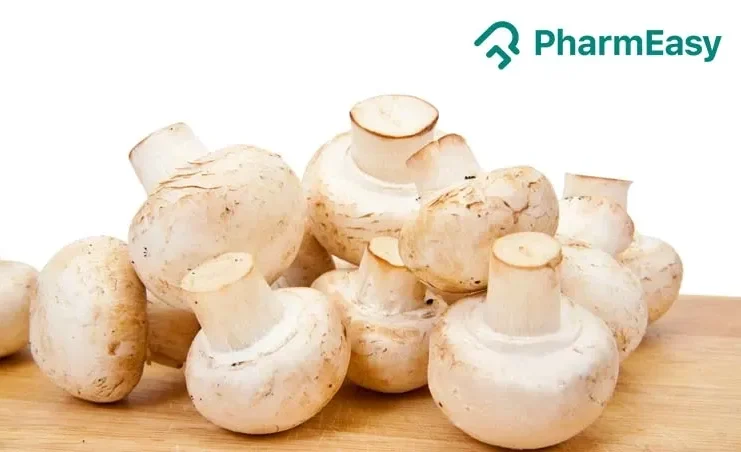Mushroom (Khumbi): Uses, Benefits, Side effects By Dr. Smita Barode
By Dr Smita Barode +2 more

Get,

to manage your symptom
Get your,


4 Cr+ families
benefitted

OTP sent to 9988776655



You’ve successfully subscribed to receive
doctor-approved tips on
Whatsapp

Get ready to feel your best.

Hi There,
Download the PharmEasy App now!!


Register to Avail the Offer
Send OTPBy continuing, you agree with our Privacy Policy and Terms and Conditions

Hi There,
Sign up on PharmEasy now!!
Trusted by 4 crore+ families

OTP sent to 9988776655



You have unlocked 25% off on medicines




Code: NU25
By Dr Smita Barode +2 more
Table of Contents
A meal without mushrooms is like a day without rain. Mushrooms or Agaricus bisporus is neither a vegetable nor fruit, instead a type of edible fungus. There are different varieties (fresh and dry) available in the market oyster, porcini and button being the most common. Generally, mushrooms have a stem covered with a fleshy rounded cap with gills underneath (umbrella like appearance). They were first cultivated in Japan and China in 600 CE. Although, now they are cultivated across the globe all year round. In India, it is widely cultivated and is economically important in states like Haryana, Uttar Pradesh, Rajasthan, Jammu and Kashmir and Himachal Pradesh. Mushrooms have an umami flavour (similar to meat) thus, they’re also called vegetarian meat. The health benefits of mushrooms are innumerable. Let us learn more about their nutritional and medicinal value1,3.

Mushrooms are packed with the goodness of protein, dietary fibre, minerals and vitamins (B1, B2, B12, C and E), terpenes, quinolones, steroids, flavonoids, antioxidants like carotenoids and polysaccharides like beta-glucan, etc. The nutritional components of mushrooms are mentioned below.
Nutritional value of mushroom (dry basis)4
Scientifically proven properties of mushrooms include:
Blood pressure issues and sodium consumption frequently coexist. Researchers believe that blood pressure might rise because sodium tends to make the body retain more fluid. I recommend considering adding mushrooms to your meals to cut back on your salt consumption. The sodium content of mushrooms is naturally low. They have a savoury flavour, so you don’t need to add as much salt to maintain healthy blood pressure13.
Dr. Siddharth Gupta, B.A.M.S, M.D (Ayu)
Some of the potential benefits of mushroom are described as follows:

Mushrooms (Khumbi) are rich in phytochemicals like alkaloids, flavonoids, phenolic acids, carotenoids, selenium, vitamins, polysaccharides and antioxidants like glutathione and ergothioneine, which may reduce the risk of cancers. Djibril et al. conducted a review in 2021, which stated that people consuming mushrooms were at a lower risk of developing cancers than the non-consumers. This indicates that consuming mushrooms may help reduce the risk of cancers. However, scientific evidence supporting this claim is limited, which requires further research6.

Non-alcoholic fatty liver disease (NAFLD) is the accumulation of more than 5% fat in the liver without any underlying hepatitis C, alcohol consumption or medications. It may progress to a chronic liver disease characterized by cirrhosis, fibrosis and hepatic cancers. Inflammation and oxidative stress are the major risk factors for NAFLD. Zhang et al. conducted a study in 2020 to assess the effect of mushroom intake on NAFLD. The findings of this study showed that a high intake of mushrooms was associated with a lower risk of NAFLD due to the presence of potent antioxidants and anti-inflammatory properties of mushrooms. Thus, the consumption of mushrooms may reduce the risk of NAFLD. However, more studies should be conducted to ascertain these claims7.

Alzheimer’s disease is a neurodegenerative disease characterized by progressive damage of neurons (functional units of the nervous system), which results in dementia and a decrease in cognition. Oxidative stress plays an important role in the pathogenesis of these diseases. Djibril M et al. conducted a review in 2022 the findings indicated that mushroom contains antioxidants like glutathione and ergothioneine, which have a protective effect on the brain. This suggests that consuming mushrooms may help manage neurodegenerative diseases like Alzheimer’s. However, scientific evidence supporting these claims is limited, and that warrants the need for more clinical studies to support these claims8.
From my knowledge, the nutrients in mushrooms, such as selenium, vitamin D and B6 may help maintain a healthy immune system. Selenium may help your body produce antioxidant enzymes that cope with cell damage. Vitamin D may promote immunological health, lower inflammation, and make cells thrive. Vitamin B6 may aid in the formation of proteins, DNA, and red blood cells in your body13.
Dr. Rajeev Singh, BAMS

A diet rich in fibre and non-digestible carbohydrates is important for a healthy gut. Hess et al. conducted a study9 in 2018 to assess the effect of mushrooms on gut health. The findings of this study show that the consumption of mushrooms may improve laxation and increase stool frequency, weight, and may benefit gut microbiota. High fibre content in mushroom helps achieve satiety and some fibres can also act as prebiotics. This indicates that mushrooms may help improve gut health, but we need more scientific evidence to support these claims.

Diabetes is a metabolic disorder characterized by increased glucose levels in the blood. Jelena et al. conducted a systematic review in 2021, which states that the polysaccharides in mushrooms exert an anti-diabetic effect by increasing number of cells of pancreas (beta-cells) and inhibiting glucose absorption. Beta cells of pancreas produce insulin and may help in controlling glucose. Therefore, mushrooms may have the potential to manage diabetes. However, more studies should be conducted to ascertain these claims10.

Though there are studies that show the benefits of mushroom in various conditions, but these are insufficient and there is a need for further studies to establish the true extent of the benefits of mushroom on human health.
Researchers have found that mushrooms may significantly help in weight reduction when combined with physical activity and other lifestyle modifications, such as opting for a healthy diet. In my opinion, mushrooms are rich in antioxidants that may lower the incidence of hypertension and other metabolic diseases such as obesity14.
Dr. Smita Barode, B.A.M.S, M.S.
You must consult a qualified doctor before taking any herbal supplements. Do not discontinue or replace an ongoing treatment of modern medicine with an ayurvedic/herbal preparation without consulting a qualified doctor.
Few side effects related to the consumption of mushroom include:
However, if you experience any adverse reactions to mushroom, it is advised to discontinue its intake and immediately contact a doctor or your Ayurvedic physician who has prescribed it. They will be able to guide you appropriately for your symptoms.
Eating mushrooms is not harmful if taken in moderate amounts. However, general precautions must be followed in the following conditions:
Mushrooms contain psilocybin, a psychedelic compound which may interact with the following drugs:
Therefore, you must always seek the advice of your Ayurvedic physician about the possible interaction of mushroom with other drugs and follow the prescription thoroughly, as they will know your health condition and other medications you are taking12.
Also Read: Matki (moth beans): Uses, Benefits, Side Effects, and More By Dr. Smita Barode
The scientific name of mushroom is Agaricus bisporus1.
Mushrooms or Agaricus bisporus is neither a vegetable nor fruit, instead a type of edible fungus1.
Yes, mushroom may help manage constipation; this effect is attributed to a high content of dietary fibre in them. However, more studies are needed to support these claims. Therefore, it is advised to consult a doctor for a proper treatment in case you have constipation9.
Yes, mushrooms are rich in Vitamin D which makes the bones strong and aids in calcium absorption. These features may help improve bone health. However, scientific evidence supporting this is limited and we need more studies to support these claims11.
Hess et al. conducted a study in 2018 which showed that consuming mushrooms in excess can result in flatulence and bloating. Also, mushroom poisoning following the consumption of poisonous mushroom species can occur12.
Disclaimer: The information provided here is for educational/awareness purposes only and is not intended to be a substitute for medical treatment by a healthcare professional and should not be relied upon to diagnose or treat any medical condition. The reader should consult a registered medical practitioner to determine the appropriateness of the information and before consuming any medication. PharmEasy does not provide any guarantee or warranty (express or implied) regarding the accuracy, adequacy, completeness, legality, reliability or usefulness of the information; and disclaims any liability arising thereof.
Links and product recommendations in the information provided here are advertisements of third-party products available on the website. PharmEasy does not make any representation on the accuracy or suitability of such products/services. Advertisements do not influence the editorial decisions or content. The information in this blog is subject to change without notice. The authors and administrators reserve the right to modify, add, or remove content without notification. It is your responsibility to review this disclaimer regularly for any changes.
Comments

Leave your comment...
You may also like
Comments